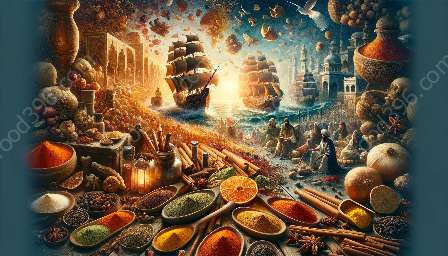Spices have been a part of human history for thousands of years, influencing cultures, trade routes, and even wars. The history of spices and their trade is deeply intertwined with the development of food culture and history worldwide. This article delves into the spice wars, their impact, and significance in shaping our world.
History of Spices and Their Trade
The story of spices dates back to ancient civilizations such as Egypt, China, and India, where various spices were used for culinary, medicinal, and religious purposes. The trade of spices flourished along the spice routes, connecting the East with the West through trade networks like the Silk Road and the maritime routes.
Spices such as cinnamon, pepper, cloves, and nutmeg were highly sought after for their ability to preserve food, enhance flavor, and even serve as status symbols. The quest for these exotic spices led to the Age of Exploration in the 15th century, with European powers venturing into unknown territories in search of new trade routes and sources of wealth.
Food Culture and History across the globe were influenced by the introduction of spices. New culinary techniques, flavors, and traditions emerged as spices made their way into various cuisines. The blending of different culinary practices and the incorporation of exotic flavors reshaped the way people prepared and enjoyed food.
Spice Wars: A Turbulent Era
The spice wars refer to a series of conflicts, battles, and power struggles fought over the control of lucrative spice trade routes and territories. Major players included European powers such as Portugal, Spain, the Netherlands, and England, all vying for supremacy in the spice trade.
The impact of the spice wars reverberated across continents, leading to geopolitical shifts, economic transformations, and cultural exchanges. The competition for dominance in the spice trade spurred the development of powerful navies, the establishment of colonies, and the rise of global empires.
Impact of Spice Wars on Global Trade
The spice wars fundamentally altered the dynamics of global trade. They stimulated advancements in navigation, shipbuilding, and exploration, ultimately paving the way for a more interconnected world. The establishment of new trade routes and the exchange of goods and ideas between East and West transformed economies and societies.
The demand for spices led to the creation of monopoly trading companies such as the Dutch East India Company and the British East India Company. These companies played a pivotal role in shaping early international trade, often operating as de facto rulers in the regions where they held monopolies.
Legacy and Significance in Food Culture and History
The legacy of spice wars is evident in the culinary diversity and cultural fusion present in today's food culture and history. Spices that were once considered rare and precious are now commonplace in kitchens worldwide, shaping the flavors of dishes across continents.
Moreover, the spice wars left an indelible mark on colonialism, globalization, and the transmission of knowledge and technology. They set the stage for the interchange of diverse culinary traditions, agricultural practices, and medicinal remedies, enriching the global tapestry of human experiences.
Conclusion
The history of spices and their trade and the impact of spice wars are intrinsically linked to our understanding of food culture and history. The pursuit of spices drove exploration, fueled conflicts, and shaped the course of world history. Today, the influence of spices continues to permeate diverse cuisines, reflecting the enduring impact of these small but mighty substances on our global heritage.

